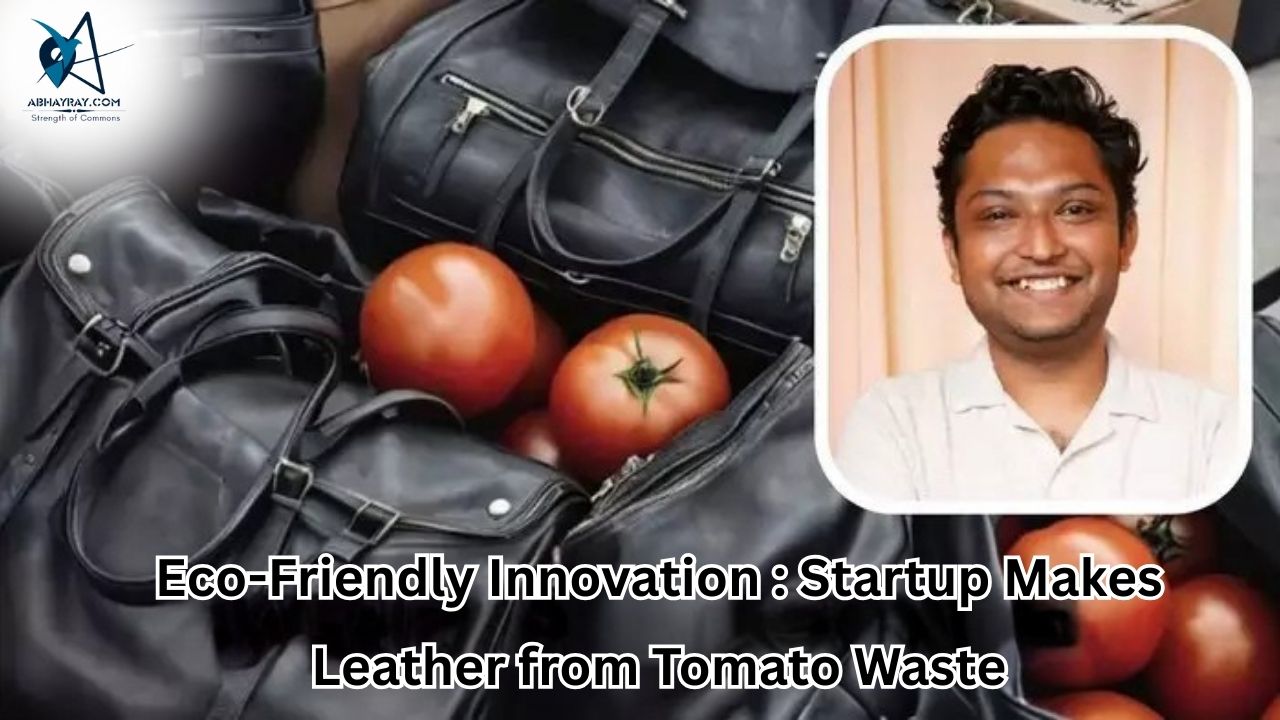Introduction
Meet 26-year-old Pretesh Mistry. His company, The Bio Company (TBC), is making bio-leather from tomato waste. This groundbreaking idea earned TBC the Best Innovation in Textile award at the PETA Vegan Fashion Awards in 2021.Pritesh Mistry’s innovative startup, The Bio Company (TBC), is tackling this question by transforming tomato waste into eco-friendly bioleather. Imagine shoes and bags made from tomatoes! As bioleather—a leather alternative derived from plant materials—gains traction, 26-year-old Mistry has found a way to turn tomato waste into stylish and sustainable products.
Bio-India Pharma Private Limited specializes in the production of sustainable bio-materials. Their mission is to develop environmentally-friendly alternatives that are compatible with both the planet and human consumption. By utilizing biotechnology, they aim to create carbon-neutral material options that replace traditional high carbon-emitting materials
Why Tomatoes – The Strategy Behind
India, as the second-largest producer of tomatoes, generates approximately 44 million tons annually, with 30-35% going to waste. This waste, primarily skin and seeds, serves as the raw material for Bioleather. Mistry notes that tomatoes are rich in pectin, a natural polymer that enhances the material’s flexibility and strength, while their fibrous structure and natural oils contribute to a leather-like texture. Mistry’s journey began as a biotechnology student at Thadomal Shahani Engineering College, where he developed Bioleather as a final-year project. His visits to Kanpur’s tanneries and local farms highlighted the environmental impact of leather tanning and food waste. These insights drove him to create a sustainable alternative addressing both issues.
Creating Bioleather from Tomato Waste
Since introducing its first product, ‘Original Bioleather’, in 2019, the company has focused on creating affordable leather that is vegan, carbon-neutral, biodegradable, and dyed using all-natural dyes.To achieve this, TBC collects tomato waste from local food processing units and farms in regions with abundant tomato production, such as Maharashtra, Gujarat, and Madhya Pradesh.
“As these by-products would otherwise go to waste, we collaborate with suppliers to gather and transform them into a valuable resource,” explains Mistry.
At their Surat facility, Bioleather is made by combining tomato by-products with biopolymers, plant-based binders, and natural fibers. The components are blended together, followed by a non-toxic curing process to create a durable, leather-like material. A final plant-based coating is applied to improve water resistance and enhance durability, resulting in a PU- and PVC-free, biodegradable leather alternative with minimal environmental impact.
Tomato leather is transforming the way we view sustainable materials. This innovative alternative to traditional leather uses leftover tomato peels and seeds, which would otherwise go to waste. It is 100% biodegradable, cruelty-free, and free from harmful chemicals like PU and PVC.
Why Choose Tomato Leather ?
- Reduces Waste
Tomato leather gives new life to food byproducts that would otherwise end up in landfills. This innovative approach directly combats food waste.
- Cruelty-Free and Ethical
No animals are harmed during the creation of tomato leather, making it a compassionate choice for fashion-conscious individuals.
- Eco-Friendly Materials
Free from PU and PVC, tomato leather does not release harmful chemicals into the environment. This makes it safer for both people and the planet.
- Durable and Versatile
Tomato leather is long-lasting and suitable for various applications, including bags, shoes, and even upholstery.
Adopters of Bioleather
Early adopters of Bioleather are emerging in the fashion, accessories, and automotive sectors, with sustainable brands incorporating it into jackets, bags, and footwear. Natasha Mangwani, CEO of Satuhati, a Toronto-based plant-based handbag brand, highlights Bioleather’s uniqueness as a PU- and PVC-free, plant-based material.
“We started designing samples with Bioleather in May 2024 and began commercial production three months later. After an incredible Black Friday and Cyber Monday sale, we restocked for the Christmas markets, and the response exceeded our expectations,” she adds.
The rise of tomato leather is encouraging designers to embrace sustainability. Many brands are now incorporating this material into their collections, creating stylish and eco-friendly products. From handbags to footwear, tomato leather offers a versatile solution that meets consumer demand for sustainable fashion. In the automotive industry, brands are also exploring Bioleather for upholstery as a sustainable alternative. Mistry adds that Bioleather has a pleasant, neutral scent, unlike the plastic-like or chemical odors of synthetic leathers. By reducing reliance on animal leather and harmful synthetics, it is reshaping the industry for the better.
Expanding Sustainable Leather Manufacturing
Currently, TBC manufactures around 5,000 meters of Bioleather per month at its Surat facility.
“This production capacity is scalable, and as demand increases, we are working to expand output while ensuring the quality and sustainability of the material remain top priorities,” says Mistry.
With its patented tomato-based Bioleather, The Bio Company is revolutionizing the leather industry, offering an eco-friendly and ethical alternative that aligns with the future of sustainable fashion and responsible consumerism.
Conclusion
The tomato-based Bioleather represents a groundbreaking shift towards sustainability in the fashion industry. By transforming food waste into a functional, eco-friendly material, it offers a cruelty-free and chemical-free alternative to conventional leather. This will pave the way for a more responsible and ethical fashion industry. As awareness grows and adoption increases among brands and consumers, tomato leather is poised to play a key role in shaping a greener and more sustainable future for fashion.
Pretesh Mistry’s innovative approach with The Bio Company (TBC) demonstrates the potential of turning agricultural waste into eco-friendly alternatives, such as bio-leather made from tomato waste. This breakthrough not only addresses sustainability in the fashion and materials industries but also offers a sustainable solution to reduce environmental impact. By embracing biotechnology, companies like Bio-India Pharma are paving the way for carbon-neutral materials, contributing to a greener planet. With creativity and innovation, these efforts hold the promise of revolutionizing traditional industries, creating a future where sustainable, plant-based materials become the norm.
GMICapitals.com RaysVeda.com GetMyStartup.com LawCanal.com GetMyIndia.com ZinCob.com Angeltors.com

